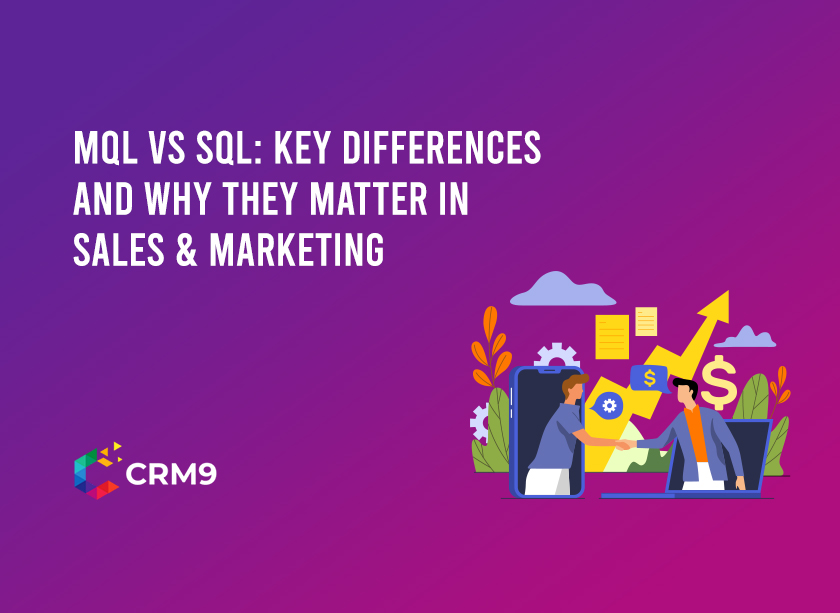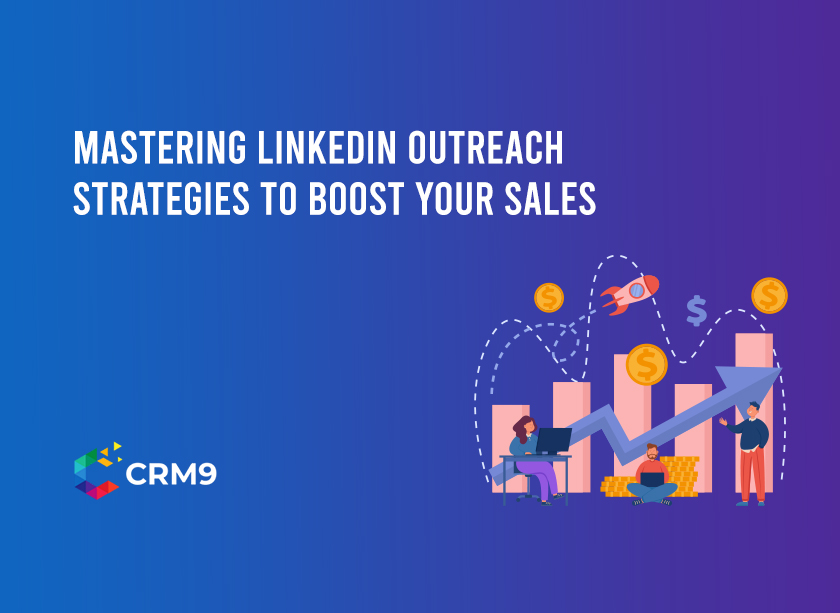The difference between a Sales Qualified Lead (SQL) vs a Marketing Qualified Lead (MQL) is one of the most significant concepts in the sales and marketing environment. Knowing the difference between MQL vs SQL will enable businesses to have an easy ride in the funnel and make deals in a shorter amount of time. These two acronyms assist companies in following the progression of a prospect reaching the customer stage, particularly when using such tools as CRM9 for lead and client management.
The MQL full form stands for Marketing Qualified Lead. It is a prospect who has already expressed her interest in your marketing activities and is most likely to be a customer in the future. An SQL or Sales Qualified Lead, on the other hand, is a person your salespeople have vetted and are prepared to purchase. We would like to dissect the differences in the first fundamentals and discuss why learning how to master these differences is the key to success.
What is an MQL (Marketing Qualified Lead)?
The full form of MQL is Marketing Qualified Lead. Simply put, a prospect who has shown interest in your marketing activities is an MQL, implying that he or she will be more willing to become a customer than a different lead.
An MQL has not yet made a purchase but shows clear interest. Their behavior indicates engagement, although they are not ready for a direct sales conversation
The CRM9 system actively tracks these MQL behaviors:
The CRM9 system tracks MQL behaviors, including:
- Getting an eBook or white paper.
- Attending a webinar.
- Visiting important product or price pages.
- Completing a form that requires information (but not a demo) named Contact Us.
- Massive email campaign interaction.
What is an SQL (Sales Qualified Lead)?
A Sales Qualified Lead (SQL) is a prospect that the sales team has vetted and approved, showing strong potential to become a paying customer. An SQL sales team member is prepared to interact with them on the spot, unlike an MQL.
When a lead becomes an SQL, it marks a key change: they are no longer only interested; they are ready to discuss solutions.
How an SQL is Generated:
One of the criteria that a lead qualifies as a SQL is by answering a Sales Development Representative (SDR) or having done a high-intent behavior:
- Making a demo company or consultation request for a product.
- Requesting an individual quote or pricing model.
- Being a positive respondent to the outreach of a direct sales company.
- Passing the BANT criteria (Budget, Authority, Need, Timeline).
The MQL to SQL Conversion Edge
The most essential point of a B2B pipeline is the conversion of a Marketing Qualified Lead (MQL) into a Sales Qualified Lead (SQL). Although the average in the industry of the ratio of MQL-to-SQL conversion is approximately 13%, high-performing SaaS companies always exceed this ratio.
The Insight: Elite organisations, which have high-tech and finely-tuned lead scoring systems, have an amazing MQLs to SQL rate of 39-40. This is three times the average and a strong indication that a stringent, quantitative method of qualification is not only an optimization, but it is a huge competitive edge that directly drives accelerated revenue growth.
Benefits of SQL Sales
Developing transitions will result in powerful SQLs that will cause instant, quantifiable returns to your revenue base. This will make sure that your sales reps are only working on the really qualified leads.
1. Higher Conversion Rates
SQLs are more likely to purchase because they have already shown a strong interest. As a result, your team can convert them faster and more often. This will increase your total sales performance.
2. Increased Sales Efficiency
SQLs are used to spend less time on cold leads by your sales team. Instead, they will be able to target prospects who are really willing to buy. This specialization makes your team activity log more productive and enables them to close more deals within the shortest time possible.
3. Shorter Sales Cycles
Furthermore, because SQLs have high qualifications, they take less time to travel through the sales funnel. As a result, deals are made quicker, and your business achieves faster results. In addition, a shorter sales cycle will enable your team to manage more leads.
4. Improved Marketing and Sales Alignment
The clear definitions of SQL between marketing and sales teams improve the collaboration of the teams. The marketing offers quality leads and sales pursue with the appropriate style. Thus, teamwork will be enhanced, and the two departments will have better outcomes.
5. Better Sales Forecasting
SQLs offer a clearer view of future sales opportunities. Since these leads are ready to buy, you can predict sales results with greater accuracy. Thus, the planning, budgeting, and performance tracking are simplified and more accurate.
6. Enhanced Customer Experience
SQLs are given attention that is related to their requirements. Customers feel appreciated as your team delivers the right response at the right time and in a personal manner. The trust gained, the loyalty fostered, and the long-term relationship with your brand improve in the experience.
Benefits of MQL Sales
The process of marketing MQL to a closed deal is rich with information. Monitoring these conversions in the custom dashboard of CRM9 would enable the marketing department to obtain a profound understanding of how buyers behave, which would help them improve content and targeting approaches.
1. Increased Efficiency
The MQL full form stands for Marketing Qualified Lead. To put it simply, it is a possible consumer who has been attracted to your product through your marketing. When marketing identifies MQLs, the team spends less time on cold leads. This increases efficiency because sales and marketing focus only on valuable prospects.
2. Higher Conversion Rates
MQLs improve conversion rates by qualifying prospects before the sales stage. Since these leads understand your offering, they move through the pipeline more quickly. With such MQLs and SQLs in the hands of your sales team, conversions occur automatically. Moreover, it minimizes time wastage and enhances the general success.
3. Improved Alignment
The improved communication between sales and marketing teams generates more powerful results. Once the two parties have come to an agreement on the definition of an MQL vs SQL in marketing, then less confusion and more effort are made. This sales and marketing alignment is a way to make sure that your marketing strategy is smooth between awareness and conversion.
4. Better ROI
Through investment in marketing qualified leads nurturing, each campaign will become more cost-effective. Since your team is targeting leads that have true potential, the marketing money that you invest is higher yielding. Moreover, your lead management processes and client management processes become more streamlined, generating long-term profitability.
5. Enhanced Lead Quality
The qualified leads’ meaning will assist you in attracting prospects who are in line with your business objectives. The meaning of MQL focuses on interest, engagement, and intent. You can only send the high-value contacts to your sales team by scoring and segmenting leads properly. This strategy makes your SQL sales stronger and enhances the quality of deals.
6. Data-Driven Insights
The modern-day businesses are dependent on precise information in order to make wise decisions. Monitoring MQLs and SQLs gives your marketing team an opportunity to determine the most effective campaigns. By understanding these, you are able to optimize content, gauge ROI, and predict growth even better. As such, your whole sales process can be seen and quantified.
| Feature | Marketing Qualified Lead (MQL) | Sales Qualified Lead (SQL) |
|---|---|---|
| Intent | Informational; Researching a problem. | Commercial; Actively seeking a solution. |
| Owner | Marketing Team | Sales Team |
| Action Taken | Downloaded a guide; Visited a few pages. | Requested a Demo; Asked for Pricing. |
| Goal | Nurture and build trust. | Close the deal and convert to a customer. |
| Stage | Top-to-Middle of the Funnel | Bottom of the Funnel |
As such, the difference between Marketing Qualified Leads (MQLs) vs Sales Qualified Leads (SQLs) is all about establishing a clean handover between your marketing and sales teams.
What are SQL and MQL in Marketing?
Marketing: The process of moving the initial interest to a final transaction in the marketing world is designed around the Marketing Qualified Lead (MQL) and Sales Qualified Lead (SQL). In simple words, the output of the successful marketing campaigns is MQLs, and the goal is SQLs.
Marketers apply potent automation and analytics software to monitor the actions of the prospects, marketing-qualified industry report or viewing a product demonstration, to show when the raw lead management is prevalent enough to be labeled a marketing-qualified lead. Thus, the whole marketing strategy is to shift the prospects towards such a critical position that all the actions will have a definite, quantifiable goal.
Consider the following situation: One marketing team is aiming at the mid-sized firms that have problems with manual billing. They conduct a campaign that would create 200 interested prospects who will download their guide on “Automating Invoices and Estimates.” These are the MQLs. Not every MQL is equal, though.
Then the team selects the top 50 MQLs by their scores, maybe those that have also been to the pricing page or asked to be sent a feature sheet. These high-intent prospects are then forwarded to the sales team to be verified. It is only after that the sales team approves them as being truly sales-ready to be followed up on that the 50 are the desired SQLs in marketing.
Ready to tighten your sales funnel with CRM9? Start by defining your MQL and SQL criteria in CRM9 today!
Conclusion
The issue of MQL vs SQL is not only an academic issue, but it is also a financial requirement. A straightforward, common definition of these two leads stages brings about efficiency, strengthening of the team morale, and directly to your bottom line. Through the clarification of specific standards that should be met to qualify as a marketing qualified lead and a sales qualified lead, and the use of a centralized platform such as CRM9, your sales and marketing teams can finally come to an agreement, end the never-ending finger-pointing, and concentrate on a singular objective: transforming prospects into loyal customers.
Related Reads
- Sales Organization Structure: Types, Purpose & Hierarchy Explained
- What is Sales? Sales Meaning, Types, and Importance Explained (Guide)
- Sales Analysis Explained: A Complete Guide to Sales Data and Trends
- Inbound vs Outbound Sales | Difference, Meaning & Strategies Explained
- What is a Sales Plan? Process, Strategy & Templates Explained
- Inside Sales Explained: Meaning, Key Roles, and Responsibilities
- What is Return on Investment (ROI) and ROI Calculation Formula?
- What is Customer Acquisition Cost and How to Calculate it?
- What is Sales Support and Why Does it Matter Most for Business Growth
- What is Sales Budget? Complete Guide with Example and Process
- What is Sales Tracking and How Does it Work?
- Top Sales Tracking Software and Apps to Boost Business Performance.
- What is Sales Support and Why Does it Matter Most for Business Growth
- What is Sales Data Analysis, and How to Perform it for Business Growth?
MQL vs. SQL FAQs:
MQL is a customer who has already been interested in the marketing operations, but has not made the choice whether to buy the products or not.
The variation between MQL and SQL could allow the companies to establish coordinated marketing and sales in such a way that the leads would be covered more conveniently.
The MQLs show the untimely buying interest, and SQLs are valid and ready to make direct sales purchases.
MQLs and SQL result in automation of nurturing leads, marketing-sales score, and handoff.
The qualified leads are the ones that qualify on the terms of interest, and the sales-qualified leads are those that are qualified as potential buyers.



